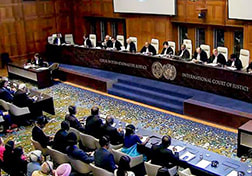THE HAGUE - While Pakistan has been claiming victory in the ICJ not ruling in favour of Kulbhushan Jadhav's release, it has apparently forgotten that one of the clauses India put forth while approaching the top UN court was that in case Jadhav was not to be released, then Pakistan should be restrained from executing the death sentence awarded by a military court.

India in its application to the ICJ against the death sentence of Jadhav, had urged that Pakistan be restrained from executing the death sentence or giving effect to the conviction of Jadhav in any manner and that he be released forthwith and Pakistan be directed to facilitate his safe passage to India.
"In the alternative, and if this Court were to find that Jadhav is not to be released, then restrain Pakistan from giving effect to the sentence awarded by the Military Court, and direct it to take steps to annul the decision of the military court, as may be available to it under the laws in force in Pakistan," it said.
"...direct a trial under the ordinary law before civilian courts, after excluding his confession that was recorded without affording consular access, in strict conformity with the provisions of the ICCPR (International Covenant on Civil and Political Rights), with full consular access and with a right to India to arrange for his legal representation," it added.
India also urged that the court declare that the death sentence on Jadhav, "arrived at by a Pakistani military court, in brazen defiance of the Vienna Convention rights" and "in defiance of elementary human rights of Jadhav" is "violative of international law and the provisions of the Vienna Convention". India also urged that "Declare that India is entitled to restitutio in integrum (or returning everything to the state as it was before)".
India had urged the ICJ to adjudge and declare that Pakistan acted in egregious breach of Article 36 of the Vienna Convention on Consular Relations, in (i) Failing to inform India, without delay, of the arrest and/or detention of Jadhav, (ii) Failing to inform Jadhav of his rights under Article 36 of the Vienna Convention on Consular Relations, (iii) Declining access to Jadhav by consular officers of India, contrary to their right to visit Jadhav, while under custody, detention or in prison, and to converse and correspond with him, or to arrange for his legal representation.
Pakistan, countering India's application, had requested the court to reject India's application in its entirety. Pakistan Foreign Minister Shah Mehmood Qureshi on Wednesday claimed that the International Court of Justice's (ICJ) ruling on Kulbhushan Jadhav was a "victory for Pakistan" as the top UN court did not ask for him to be released.
"Commander Jadhav shall remain in Pakistan. He shall be treated in accordance with the laws of Pakistan. This is a victory for Pakistan," Qureshi tweeted. The Pakistan Foreign Office in a statement said the fact that the ICJ did not ask Pakistan to release or acquit Jadhav meant that the UN court had "not accepted India's plea" for his release. The Foreign Office also said that Pakistan was a responsible member of the international community. "Having heard the judgment, Pakistan will now proceed as per law," the statement said.
"In the alternative, and if this Court were to find that Jadhav is not to be released, then restrain Pakistan from giving effect to the sentence awarded by the Military Court, and direct it to take steps to annul the decision of the military court, as may be available to it under the laws in force in Pakistan," it said.
"...direct a trial under the ordinary law before civilian courts, after excluding his confession that was recorded without affording consular access, in strict conformity with the provisions of the ICCPR (International Covenant on Civil and Political Rights), with full consular access and with a right to India to arrange for his legal representation," it added.
India also urged that the court declare that the death sentence on Jadhav, "arrived at by a Pakistani military court, in brazen defiance of the Vienna Convention rights" and "in defiance of elementary human rights of Jadhav" is "violative of international law and the provisions of the Vienna Convention". India also urged that "Declare that India is entitled to restitutio in integrum (or returning everything to the state as it was before)".
India had urged the ICJ to adjudge and declare that Pakistan acted in egregious breach of Article 36 of the Vienna Convention on Consular Relations, in (i) Failing to inform India, without delay, of the arrest and/or detention of Jadhav, (ii) Failing to inform Jadhav of his rights under Article 36 of the Vienna Convention on Consular Relations, (iii) Declining access to Jadhav by consular officers of India, contrary to their right to visit Jadhav, while under custody, detention or in prison, and to converse and correspond with him, or to arrange for his legal representation.
Pakistan, countering India's application, had requested the court to reject India's application in its entirety. Pakistan Foreign Minister Shah Mehmood Qureshi on Wednesday claimed that the International Court of Justice's (ICJ) ruling on Kulbhushan Jadhav was a "victory for Pakistan" as the top UN court did not ask for him to be released.
"Commander Jadhav shall remain in Pakistan. He shall be treated in accordance with the laws of Pakistan. This is a victory for Pakistan," Qureshi tweeted. The Pakistan Foreign Office in a statement said the fact that the ICJ did not ask Pakistan to release or acquit Jadhav meant that the UN court had "not accepted India's plea" for his release. The Foreign Office also said that Pakistan was a responsible member of the international community. "Having heard the judgment, Pakistan will now proceed as per law," the statement said.